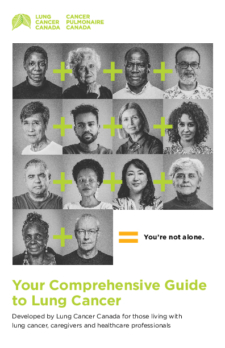Talking About Your Lung Cancer
Lung Cancer Canada offers a variety of programs and support services to assist persons throughout the trajectory of the disease as well as their loved ones. We meet you where you are, and help guide you through the practical, physical, social, and emotional challenges that comes with a lung cancer diagnosis.
Our Airways of Hope support programs provide therapeutic spaces to share and learn from others in a safe and supportive manner. Several formats exist allowing for you to choose what is best suited to your needs and comfort level. All of our programs come at no cost to you and there is no obligation.
To register for any of the programs listed below please fill in the form below and someone from our support staff team will contact you withing 5 business days.



